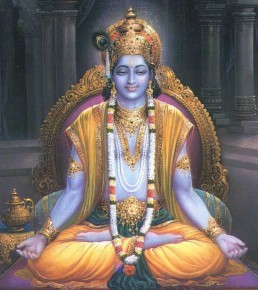Commentary
This verse can be considered as the conclusion of The Lord’s discourses to Arjuna in the battlefield of Kurukshetra. Sri Krishna says that he has declared to Arjuna (through him to the entire humanity) all the essential features of the right way of living and its noble endeavors for which there is nothing more to add.
This knowledge is more secret than all the secrets because it is not easy for one to understand the Gita way of life and its vision of the goal in all their implications unless one is initiated into them. Even the very sharp intellect will fail to feel the presence of the subtle, eternal and infinite Self. Sri Krishna advises Arjuna to think and reflect over what all He had declared and thereafter take such decision as he thinks proper without blindly accepting what has been told to him. Teaching is not indoctrination. Thus The Lord leaves the decision to act and lead a higher life to Arjuna’s own free and sweet choice after considering all the points brought to his notice.
There is no compulsion involved and free choice is the characteristic of Hinduism as the human personality cannot grow morally and ethically through coercion. The Supreme does not impose His command; we are free at any moment to reject or accept the Divine call. The integral surrender should be made with the fullest consent of the seeker. God does not do the climbing for us but supports us whenever we stumble, comfort us when we fall. He is prepared to wait till we turn to Him. Thus The Lord’s approach is counseling but not commanding. The scriptures serve the purpose of telling man what he should do and what he should not. It is up to man himself to choose the right and to reject the wrong
Swami Chinmayananda
Swami Chinmayananda Commentary
The commentary on this verse and the rest, is avaialble for free as:
Kindle eBook
Google Play Book
Apple Books
Adi Sankara Commentary
Te, to you; akhyatam, has been imparted, spoken of; maya, by Me who am the omniscient God; iti, this; jnanam, knowledge; which is guhyataram, more secret; guhyat, than any secret-i. e. it is extremely profound, mystical. Vimrsya, pondering over, contemplating on; etat, this, the Scripture as imparted; asesena, as a whole, and also on all the subjects dealt with; kuru, do; yatha icchasi tatha, as you like. ‘Once again, hear what is beng said by Me:’
The Bhagavad Gita with the commentary of Sri Sankaracharya – Translated by Alladi Mahadeva Sastry
Holy Geeta – Commentary by Swami Chinmayananda
The Bhagavad Gita by Eknath Easwaran – Best selling translation of the Bhagavad Gita
The Bhagavad Gita – Translation and Commentary by Swami Sivananda
Bhagavad Gita – Translation and Commentary by Bhaktivedanta Swami Prabupadha
Srimad Bhagavad Gita Chapter 18 – Verse 63 – 18.63 iti te jnanamakhyatam – All Bhagavad Gita (Geeta) Verses in Sanskrit, English, Transliteration, Word Meaning, Translation, Audio, Shankara Bhashya, Adi Sankaracharya Commentary and Links to Videos by Swami Chinmayananda and others – 18-63

